Sustainability
Interview with outside officers
Interview with outside officers
- Progress on SHIFT2030, our Medium- to Long-Term Business Plan
- What is required to promote diversity in the NITTA Group
- Efforts to be made for strengthening human capital
- Issues to be addressed with respect to ESG management and contribution to the SDGs
- Expectations for the NITTA Group’s sustainable value improvement

As we enter the third year of Phase 1 of the Nitta Group’s medium- to long-term business plan, we asked our Outside Directors, Hiroe Toyoshima and Takehisa Ikeda, and our Outside Auditor Kazuyoshi Matsuura about strengthening human capital and promotion of diversity, which will be needed to achieve our medium- to long-term business plan and sustained improvement of corporate value.
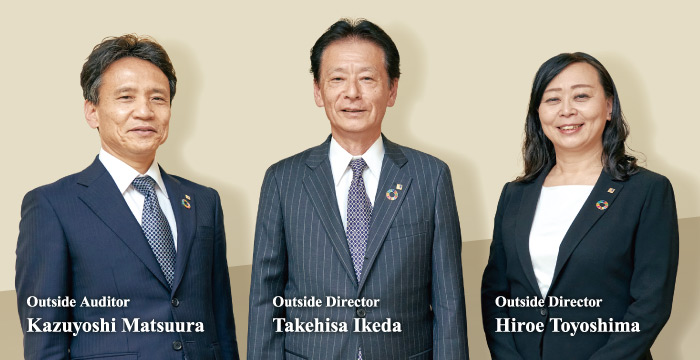
Progress on SHIFT2030, our Medium- to Long-Term Business Plan
Ikeda:I became an executive in June 2021, the year the medium- to long-term management plan SHIFT2030 started. Through discussions at meetings of the Board of Directors and other meetings, we deepen our understanding of investment and business progress based on plans. In the fiscal year when I was appointed, the Group set record profits, and in the last fiscal year it achieved sales greater than that. For such reasons, I feel the business plan is progressing well. However, there have been major changes in the business environment, such as the COVID-19 pandemic that lasted three years, the Russian invasion of Ukraine, and soaring resource prices, and there are difficult situations when we look at specific sectors. There are seven more years until 2030, and the time has likely come to review the medium- to long-term business plan in light of social changes.
Toyoshima:I see the figures are coming along well regarding the targets and progress of each department of the Nitta Group. I’m impressed that the Group is achieving good results in this difficult business environment, but what is the actual situation, what are the specifics, underlying sales and profits? We will need to reexamine things like that. Also, I feel the Group is energetically tackling new business, and promising possibilities have come into view. Be that as it may, the Group is still at the stage of laying the groundwork and planting seeds. Results will come in the future, so I expect efforts will be further strengthened going forward, and that this will be linked with major growth.
Matsuura:It’s been only about a year since I was appointed as an Outside Audit & Supervisory Board Member so my time here has been short, but I am deepening my understanding of progress of the medium- to long-term business plan through discussions at meetings of the Board of Directors and the Audit & Supervisory Board. Beyond that, I’m very impressed by the extreme efficiency of company operations. When I have doubts and ask a question, the response is quick and detailed, so I feel problems are being solved effectively. Also, when I toured the Nara Plant, and the Kyoto Plant of NITTA Dupont, I saw the working style of all the employees, and I was very impressed by their seriousness and passion. Based on the atmosphere on site, I realized that the Nitta Group is a very good company. I feel that the group’s management plan and business direction will progress smoothly as the group’s management plan and business direction will also be well disseminated to the field.
What is required to promote diversity in the NITTA Group
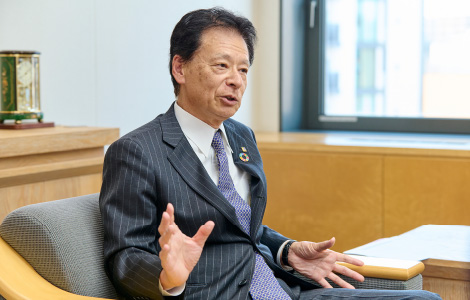
Ikeda:Many Japanese companies lag behind Western companies when it comes to diversity initiatives. I’m sure the NITTA Group is also struggling. The term diversity has a wide range of meanings, and is not just an issue between men and women. Foreign human resources and LGBT issues are also very important issues. At the current stage, I think the NITTA Group’s promotion of diversity is still focused on the advancement of women. The NITTA Group has many bases overseas and has a rich workforce of foreign nationals. In order to continue to grow as a global company, I believe that the mobility of human resources both domestically and internationally is a key, for example, by appointing managers and leaders of overseas bases to be responsible for domestic operations. Additionally, when it comes to female executives and executives, I think it would be a good idea to consider inviting them from outside the company, rather than just training them internally.
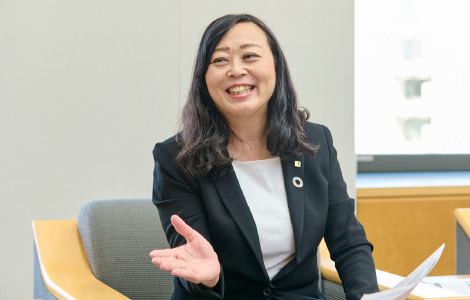
Toyoshima:I get the impression that the NITTA Group is proactive in its efforts to promote the empowerment of women. Japanese companies, especially in the manufacturing industry, have a low number of female executives and executives. However, the NITTA Group appears to be taking this issue seriously and working hard to tackle it. I have also proposed holding a “meeting to exchange opinions with female employees,” and as we proceed with system reform, the number of women in management positions is gradually increasing. We are making progress in creating a workplace environment where women can thrive, and we expect this to develop further going forward.
However, we have not yet reached the level of diversity promotion that society requires, so we would like to continue making recommendations from multiple angles. The next step is to utilize overseas human resources. In fact, Japanese companies with a high overseas sales ratio employ many foreigners as executive officers. The NITTA Group may also consider having overseas human resources participate in management.
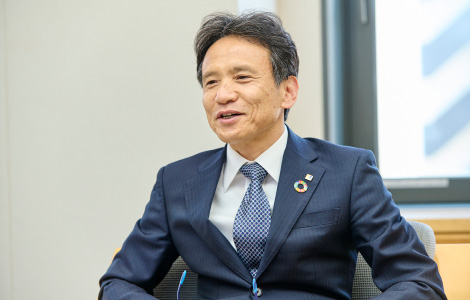
Matsuura:I think diversity is still a new and difficult topic for Japanese companies. The term “diversity” is difficult to understand, and the challenge is how to accept people with different values, cultures, and lifestyles into the company. The NITTA Group’s Charter of Conduct states, “Respect for each other and a comfortable work environment,” and “We respect the diversity, personality, and individuality of our employees, and strive to create a comfortable work environment that takes into consideration physical and mental health and safety.” I think this Charter of Conduct has excellent content that perfectly matches the current SDGs and ESG requirements with the company’s philosophy. It clearly states the values and ethics that all employees of the NITTA Group should have in common. Sustainability promotion activities are being carried out based on this Charter of Conduct, and I hope that our employees will continue these activities and work to promote diversity.
Toyoshima:I don’t think many Japanese companies realize the benefits of working on diversity. For example, how can female executives be useful? How will business grow if we increase the proportion of female executives? As a woman, it is very meaningful for me to be given the position of outside director, and I feel it is an important responsibility. I would like to personally demonstrate my commitment to promoting diversity.
Ikeda:What does diversity mean to Japanese society as a whole? Why do we need to work on it? I don't think I really understood it at first. Having women in management positions and on the front lines of the workplace allows them to utilize perspectives and sensibilities that men do not have. In addition, by having people from overseas and other people with different values and cultures in the company, the employees around them will have a broader perspective and come to see work from a variety of perspectives. I believe it is important to understand these benefits and promote diverse human resources.
Efforts to be made for strengthening human capital
Matsuura:Needless to say, bolstering education and training programs will be vital for improving employee skill and knowledge. When it comes to human resource development, the Nitta Group has established a training system for each purpose, such as theme-specific and position-specific training, and this is a great benefit for employees, I feel. I also regard the Nitta Group’s promotion of NS Activities, “own process completion,” and other activities as praiseworthy these activities.
Toyoshima:I feel the enhanced education system has delivered results in the development of human capital of the Nitta Group. I think initiatives outside the education system have also achieved similar results. New businesses are a good example. In the new business project spearheaded by top management, a range of approaches are used, such as recruiting applicants from inside the company, using outside experts, and holding training and study groups on exploring for new business. These efforts help to motivate employees. If employee morale improves, and the seeds of the Company’s new businesses take off, this should help build win-win relationships where both employees and the company can grow. Also, I think the President’s Award is a good evaluation system. When those engaged in development of products, technologies, and services, as employees of a manufacturer, see the fruits of their efforts recognized in the course of day-to-day work, it is likely to be a strong motivator. My impression is that Nitta has achieved such work environments, where people have a forward-looking attitude and enjoy their work.
Ikeda:As one would expect from a Company with a long history, the Nitta Group is doing well, I think, in developing its education system and rewarding work environments. Today, the focus is on strengthening and developing human capital, and many Japanese companies are searching for the best approach. Firms overseas don’t have a culture of educating and developing human resources. Typically, they scout and hire personnel with the necessary skills from outside. I hope that, going forward, Nitta will continue to strengthen and enhance its human resources development system in a way that fits with Japanese culture.
Issues to be addressed with respect to ESG management and contribution to the SDGs
Ikeda:We talk about ESG and SDGs, but their scope is broad, and the issues to address are extremely numerous. Against that backdrop, I feel the Nitta Group is making solid efforts that are in no way inferior to other companies. I always feel that Nitta should more actively use the expansive forest the company owns in Hokkaido to showcase the appeal of the company. The forest covers approximately 6,700ha, large enough to rank in the top 10 among forests owned by private companies in Japan. That forest alone makes a major social contribution in reducing CO2. I think perhaps it’s important to take that a step further, enlisting the help of experts to inform the public of that forest’s existence and value, and using it for new business. Because it is large in scale, one idea is to form an alliance with companies engaged in similar initiatives to address environmental issues. A framework will need to be created to showcase the appeal of the forest to society. I too would like to tour the site, and make some proposals.
Matsuura:At Matsuyama University, where I work, a team of 4 people, 2 teaching staff and 2 administrative staff, visit the forest and ranch in Hokkaido every year for training. It is a very valuable experience. I have heard reports in the Sustainability Committee, and I believe the Nitta Group is tackling the problem of decarbonization head-on through environmental investment, utilization of renewable energy, and other steps. Going forward, I hope the Group will continue those efforts. Climate change mitigation and other environmental measures are very important social issues, and thus corporate value can be enhanced by making this a priority area, and disseminating information on results outside the company. In Europe, they have established, as the European Green Deal, a target of making the entire EU climate neutral (net zero greenhouse gas emissions) in 2050, and they have set aside a considerable budget for that purpose. How can business contribute to environmental conservation from a sustainable perspective? Many companies all over the world are launching initiatives, such as linking up with employment and education, to make such business profitable. I think the Nitta Group should more actively disseminate information outside the company on how it is contributing to the solution of global environmental problems.
Toyoshima:Looking back to when Nitta was founded, we have heard the history: how Nitta used forest resources and raised forests to obtain tannin for tanning leather, and how Nitta has continued to sustainably grow its business while protecting the natural environment, through efforts such as using timber in other businesses. Nitta Group businesses have been linked with the future from the time of our founding. Returning to the starting point, we will connect with the future. By carrying on the mission and ideas of our founder, won’t growth for the future come clearer into view?
- SDGs
Materiality
Expectations for the NITTA Group’s sustainable value improvement
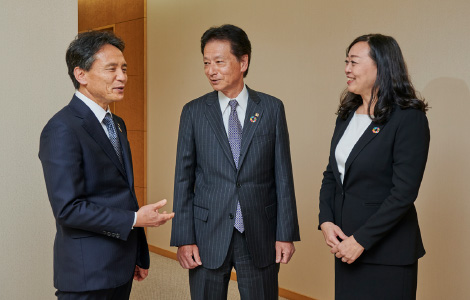
Ikeda:Since I come from a financial company, I have looked at many companies in terms of numbers. Companies that grow and companies that do not grow are always reflected in the numbers. You can predict risks by looking at various indicators shown by companies, such as company management and M&A. It is difficult to launch a new business from scratch, but by forming an alliance, you can dynamically and speedily promote new business. I hope I can give you advice from various angles. The NITTA Group is an extremely unique company with a long history dating back 138 years. The assets we have accumulated so far are very large, and in order to extend them for the next 150 or 200 years, it is essential to take on new challenges. I would like to contribute to the future growth of the NITTA Group.
Toyoshima:In addition to meeting expectations in my field of expertise as a lawyer, I would also like to provide advice on various business decisions. International transactions are essential for the NITTA Group, which is expanding its business overseas. In order to resolve various issues such as contracts and disputes, I would like to share knowledge of overseas ways of thinking and culture. Rather than relying on overseas bases, interacting with foreign human resources without hesitation is a necessary initiative for further business growth and risk management. I would like to provide sound advice regarding these overseas business initiatives.
Matsuura:My field of expertise is international economics with a focus on Europe. For a company to grow sustainably, it is important to adapt to the international environment, and I would like to contribute to the NITTA Group's business and governance from a geopolitical perspective.




